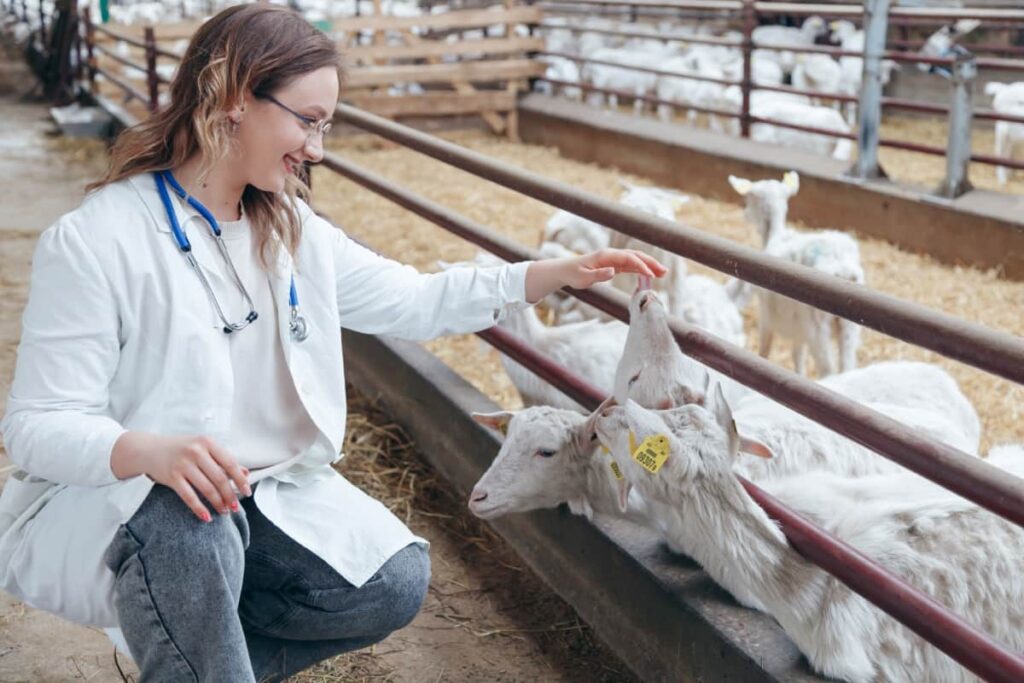Goat farming in Nigeria is a profitable venture, but disease outbreaks can lead to significant losses. Without proper care, common goat diseases like Peste des Petits Ruminants (PPR), sheeppox, and goatpox can spread rapidly, affecting both productivity and profitability. The good news? With the right preventive measures and treatment strategies, you can keep your goats healthy and disease-free.
Here are nine practical strategies to prevent and manage common goat diseases in Nigeria:
1. Vaccinate Your Goats Regularly
Vaccination is the most effective way to prevent fatal diseases. For instance, PPR vaccines provide lifelong immunity against one of the deadliest viral diseases in goats (PMC). Similarly, vaccination for sheeppox and goatpox is recommended, especially in endemic areas (ScienceDirect).
- PPR Vaccine – Administer to all goats at 3-6 months old
- Goatpox Vaccine – Given annually in high-risk areas
- Enterotoxemia Vaccine – Protects against Clostridial infections
- Anthrax Vaccine – Recommended in areas with past outbreaks
- Foot-and-Mouth Disease Vaccine – Prevents highly contagious viral infection
2. Practice Good Biosecurity Measures
To prevent disease outbreaks, you must control movement in and out of your farm. Diseases can spread through contaminated feed, water, or contact with infected animals.
- Quarantine new goats for at least six weeks before introducing them to your herd (Horizon Vet Brighton)
- Disinfect feeding troughs and housing areas regularly
- Avoid sharing equipment with other farms
- Restrict visitors from entering goat pens
- Provide footbaths at entry points to prevent disease introduction
3. Provide Clean and Nutritious Feed
Malnourished goats have weak immune systems, making them prone to infections. Offer a balanced diet rich in proteins, minerals, and vitamins.
- Roughage: Good-quality hay or fresh grass
- Concentrates: Maize bran, groundnut cake, or soybeans
- Mineral Supplements: Salt licks and bone meal to prevent deficiencies
- Clean Drinking Water: Ensure fresh, uncontaminated water is always available
- Probiotics & Prebiotics: Improve gut health and digestion
4. Ensure Proper Housing and Ventilation
Overcrowded and poorly ventilated shelters encourage the spread of respiratory diseases like pneumonia.
- Provide adequate space (at least 1.5 square meters per adult goat)
- Keep the floor dry and clean to prevent foot rot
- Use raised platforms to prevent direct contact with wet or muddy ground
- Install proper drainage to prevent water accumulation
- Allow for cross-ventilation to reduce respiratory infections
5. Control Parasites Effectively
Internal parasites like worms and external parasites like ticks can weaken goats and make them susceptible to infections.
- Deworm goats every three months with broad-spectrum dewormers
- Spray or dip goats in acaricides to control ticks and lice
- Rotate grazing fields to break parasite life cycles
- Use herbal dewormers as a natural alternative
- Keep bedding clean and dry to minimize flea and mite infestations
6. Recognize Early Signs of Disease
Early detection can prevent a disease from spreading. Watch out for symptoms such as:
- Loss of appetite and weight
- Diarrhea or scours
- Nasal discharge and coughing (common in pneumonia and PPR)
- Swollen joints or limping (could indicate foot rot or arthritis)
- Skin lesions and scabs (possible sheeppox or goatpox)
- Fever and lethargy
- Labored breathing and excessive salivation
7. Seek Veterinary Help Immediately
Many goat farmers rely on traditional treatments, but some diseases require professional veterinary care.
- Contact a vet for accurate diagnosis and treatment
- Use antibiotics only under veterinary guidance to prevent antibiotic resistance
- Keep records of health treatments and vaccinations
- Get fecal exams to check for internal parasites
- Isolate sick goats to prevent disease spread
8. Practice Proper Milking Hygiene
Contaminated milk can spread bacterial infections like mastitis.
- Wash hands before and after milking
- Clean udders with warm water before milking
- Store milk at low temperatures to prevent bacterial growth
- Use separate towels for each goat to avoid cross-contamination
- Disinfect milking equipment after each use
9. Educate Farm Workers on Goat Health
Your farm staff should be trained to detect disease symptoms and follow proper management practices.
- Hold regular workshops on goat disease prevention
- Encourage farm workers to report any unusual signs in animals immediately
- Train workers on administering vaccines and dewormers properly
- Establish clear protocols for handling sick animals
Conclusion
Preventing and managing common goat diseases in Nigeria requires a proactive approach. Regular vaccination, good hygiene, proper nutrition, and veterinary care can significantly reduce disease risks and improve your herd’s productivity. By following these strategies, you can ensure a healthier farm and higher profits.




